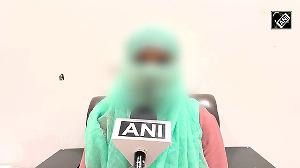Rubbishing the Indian Army's claims that delayed air strikes led to higher casualties in Kargil, the man who was in charge of air operations during the 1999 conflict has said the blame lies with the army's poor leadership.
| |||||||||||
Air Marshal Patney, one of the most decorated fighter pilots in the Indian Air Force's history, was awarded the Sarvottam Yudh Seva Medal for spearheading air attacks during the Kargil war. He was also a member of the last National Security Advisory Board.
The six-volume report by the Directorate of Military Operations and Army Training Command was completed a couple of years after the Kargil conflict, but its contents had remained a secret.
According to details available now, the report says delays in starting air strikes in Kargil led to the large number of army casualties.
It also speaks of lack of coordination with air force, poor air space management over the battlefield and the vulnerability of communication links.
"By now the whole country and international community knows that the Indian armed forces, particularly the army, was very poor (in tactical planning). Instead of keeping quiet, they (the army) want to point fingers at others," Air Marshal Patney told rediff.com
"There should have been better coordination. They find fault, but they did not consult us before completing the report. They not at all consulted us, not at all," he said.
Raising serious questions about the leadership of then army chief General Ved Prakash Malik during the conflict, Air Marshal Patney said: "It was such poor leadership by sending men to their deaths. The tactical options (exercised by him) were militarily E grade, that is fail and worse."
The air marshal said it must be investigated further why the report has been leaked now. On the face of it, the blame for delaying the air strikes is being laid at the door step of the last government. But there could be others gaining out of the entire exercise, he said.
The Kargil report has come as ammunition for the new government, facing criticism over the alleged criminality of some of its ministers.
The report has also come at a time when intense jockeying is underway between senior military officers to become the first chief of defence staff.
"During the Kargil Review Committee meetings, we pointed out that there was no problem in coordination and we all said we must have better intelligence gathering. The fact is if we were allowed to cross (the Line of Control) we would have done anything," Air Marshal Patney said.
He said it is also not right to blame the last government for delaying air strikes.
"We were ready from about May 6 for air operations. The political decision was required. The point is till quite a long time nobody actually knew how serious the problem was. If it was so serious, why would the army chief push off on a foreign tour?" the air marshal asked.
General Malik was on a tour of Poland till May 19. By then the Indian Army suffered heavy casualties on the Kargil peaks.
Air Marshal Patney said the army officially did not place a request for air strikes until after May 20 or so. "The case for air operations was put up to the government after Malik returned from the foreign trip and toured Srinagar and other areas. Under those circumstances the government asked for more details and that took three or four days. That is not a great amount of delay. The air strikes were cleared on May 25. The government didn't dilly-dally. It was a clear intelligence failure," he said.
"The other argument that army casualties could have been less had the air force began operations early is unfounded. Some 80 percent of their casualties were due to Pakistani artillery firing, not frontal attacks. The road from Zojilla to Leh was full of military convoys and were easy targets. Since they (the Pakistanis) had taken up positions at heights they were able to direct artillery with accuracy," he added.
Air Marshal Patney said had the air force been allowed to cross the LoC "it would have been a different story."
He revealed that during discussions on crossing the LoC, General Malik had opposed the idea.
"Had we crossed, we would have dealt with their artillery, their supply lines etc," Air Marshal Patney said.
He said the entire operation by the army lacked any tactical sense. "What they (the army) ought to have done was to hold on to the positions, take stock of the situation and ask air force to go out and hit their (Pakistani) artillery and supply lines, soften them out and then send the army on ground. That would have been correct militarily. But they wanted to charge, wanted quick results."






